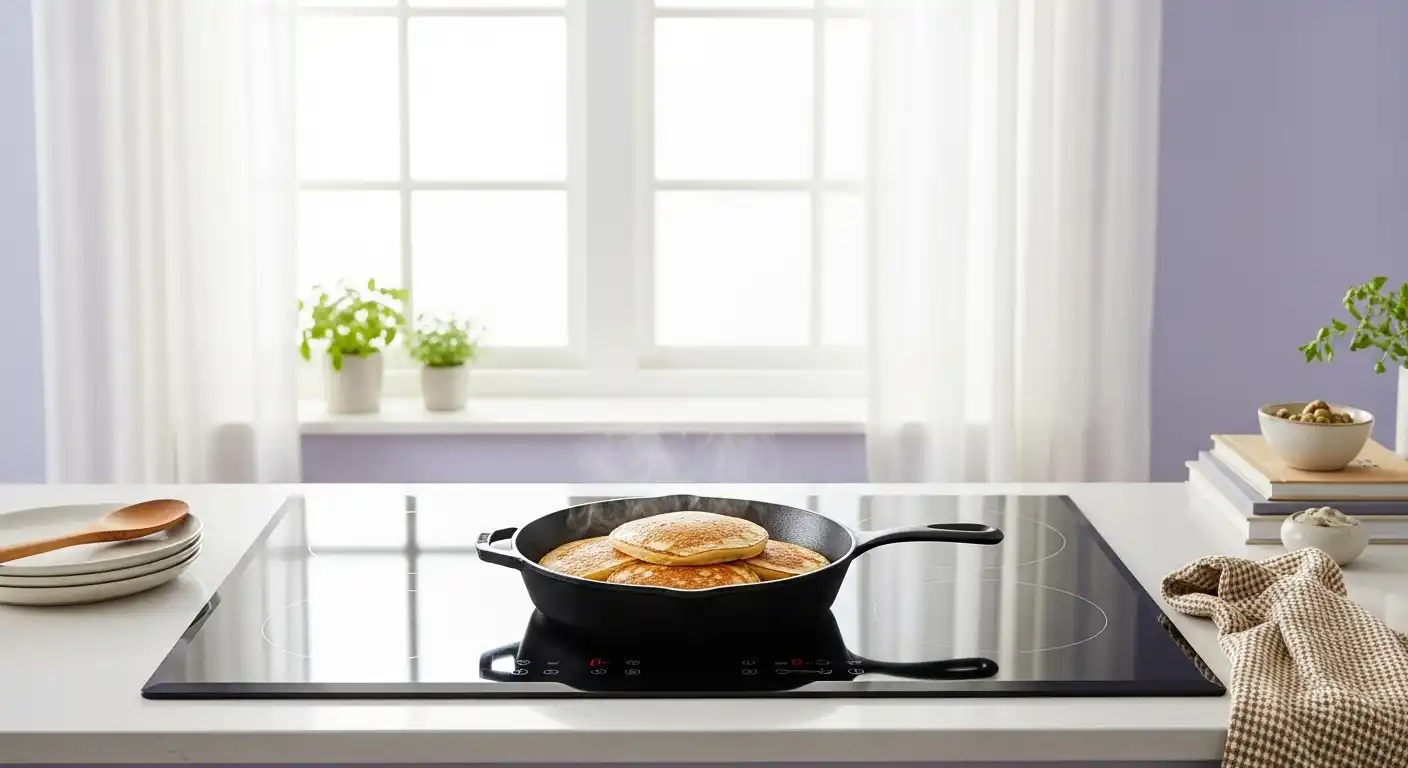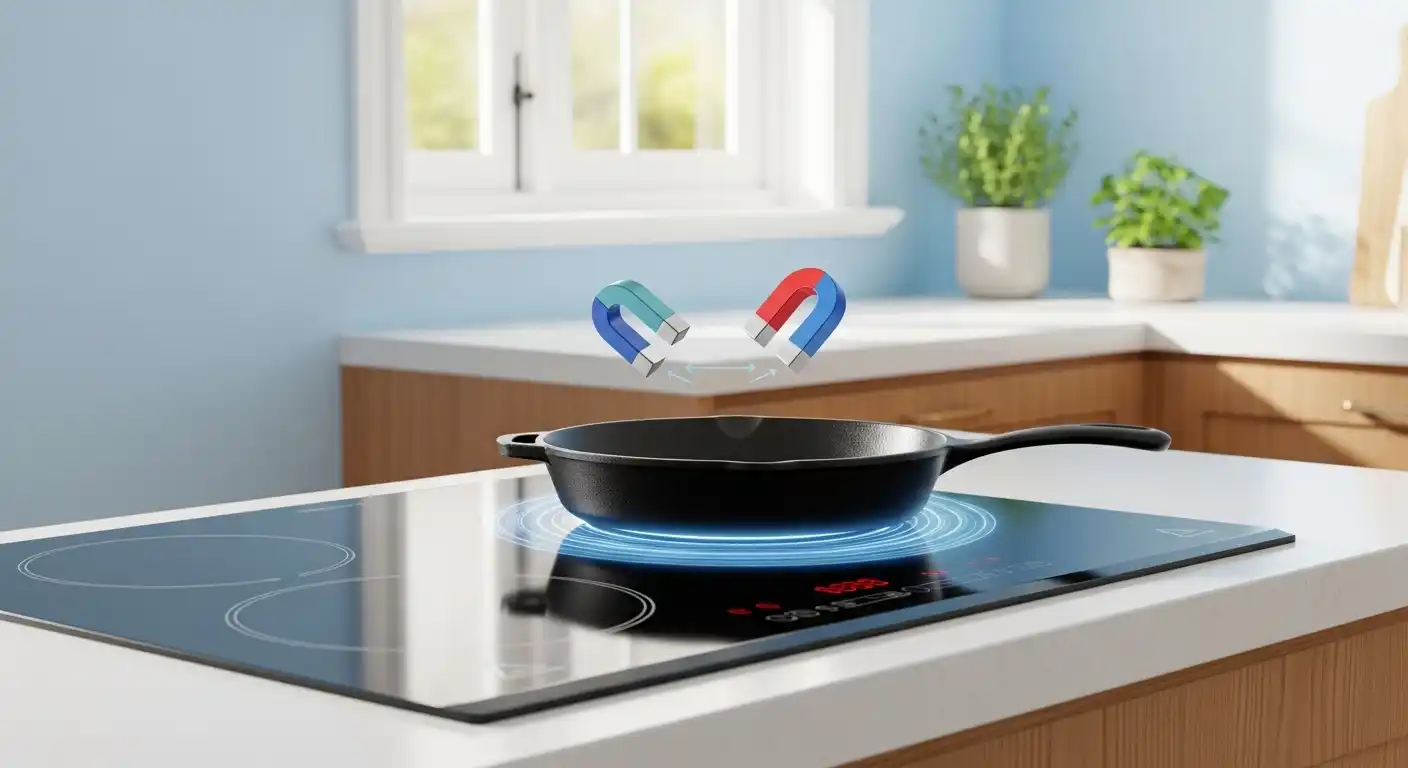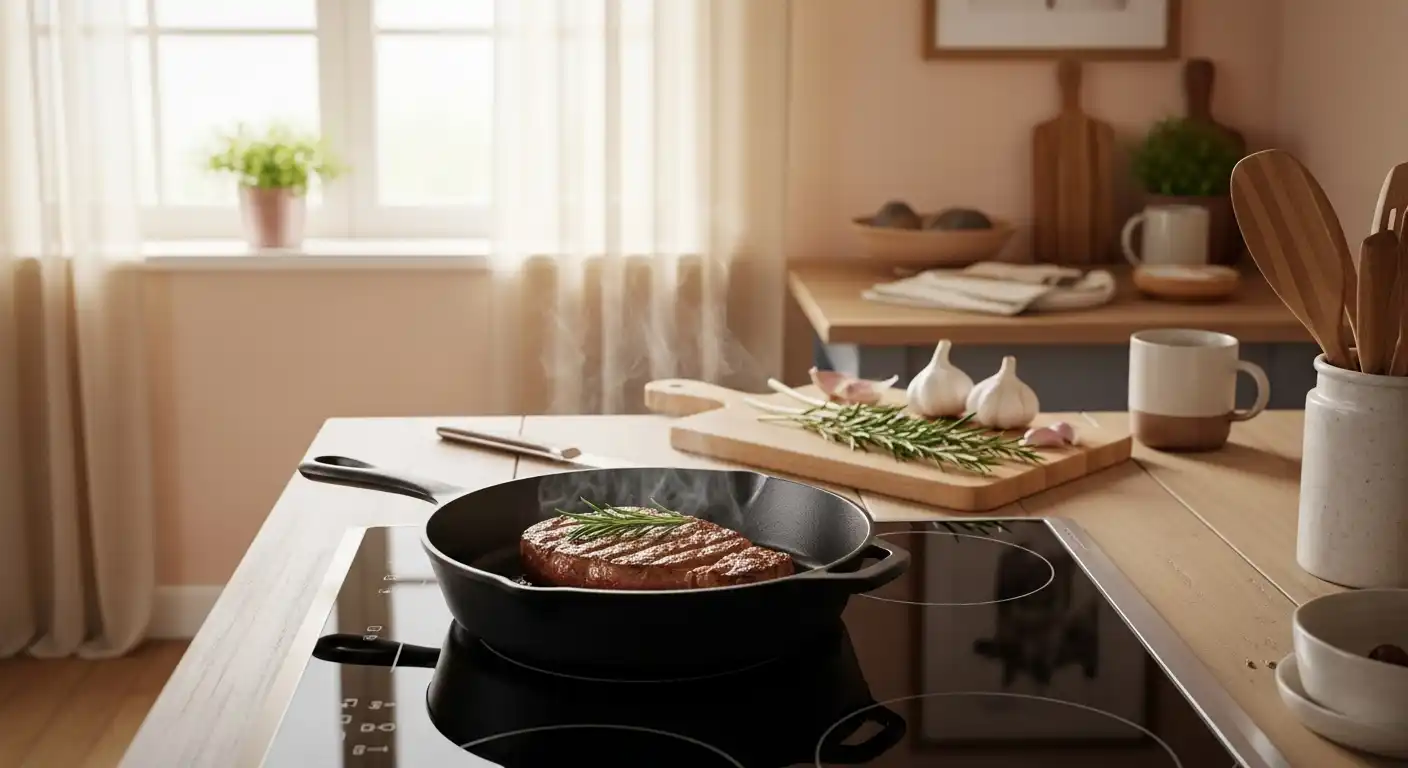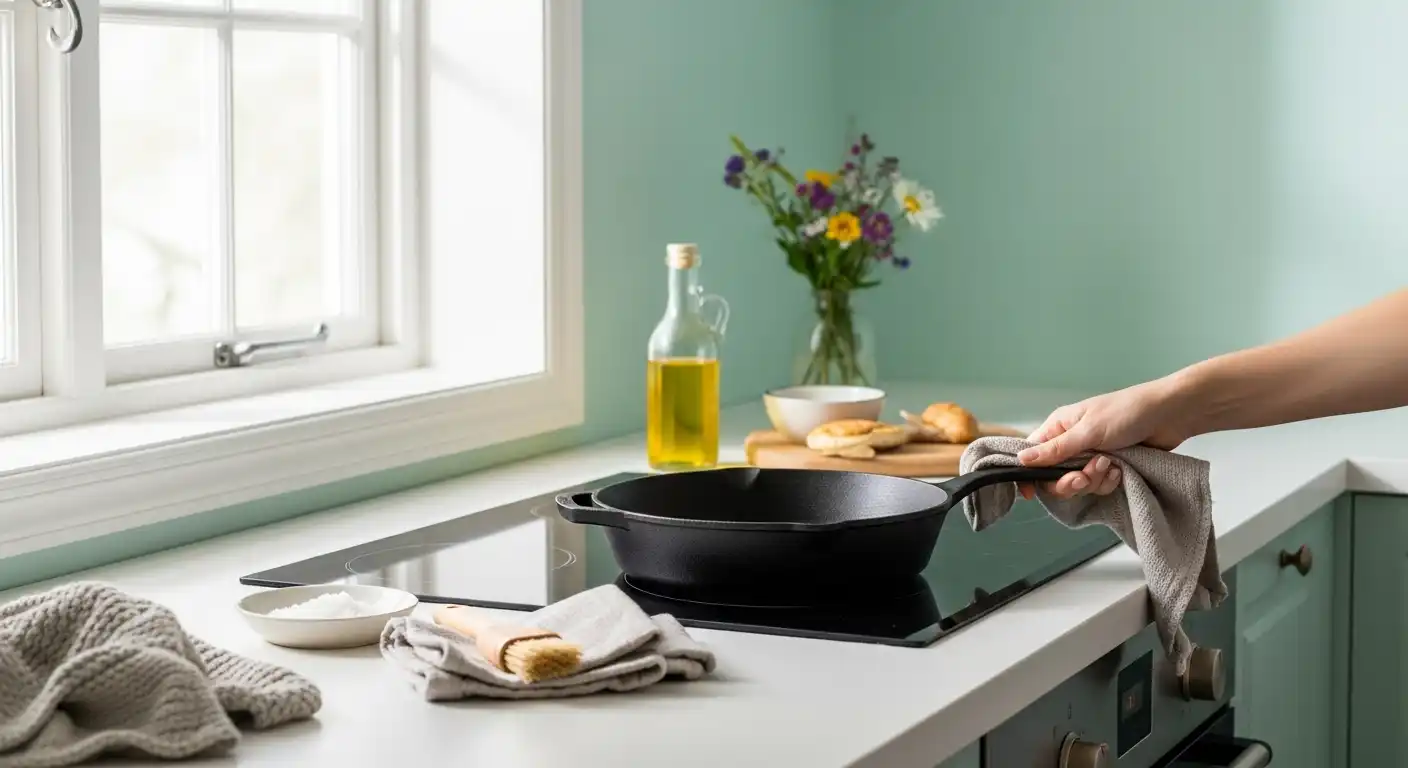Can You Use A Cast Iron Skillet On An Induction Cooktop?

Induction cooking has surged in popularity thanks to its efficiency, precision, and sleek design.
But if you’re a fan of cast iron cookware, you might be wondering: Can you use a cast iron skillet on an induction cooktop?
The short answer is yes, and this blog post will dive into why cast iron is a fantastic match for induction cooking, how to use it effectively, and tips to ensure your cookware and cooktop stay in top shape.
How Induction Cooktops Work
Induction cooktops use electromagnetic fields to heat cookware directly, unlike traditional gas or electric stovetops that heat the surface first.
🎄 Christmas & Year-End Amazon Deals !
Don’t miss out on the best discounts and top-rated products available right now!
*As an Amazon Associate, I earn from qualifying purchases.

A copper coil beneath the cooktop generates a magnetic field that induces a current in the cookware, creating heat.
For this to work, your cookware must be ferromagnetic—meaning it needs to be made of a material that a magnet can stick to.
This is where cast iron shines, as it’s naturally magnetic and highly compatible with induction technology.
Why Cast Iron is Perfect for Induction Cooking
Cast iron skillets are not only compatible with induction cooktops but are often considered one of the best choices.

Their ferromagnetic properties allow them to interact efficiently with the magnetic field, resulting in even and consistent heating.
Additionally, cast iron’s ability to retain heat makes it ideal for induction cooking, where precise temperature control is key.
Whether you’re searing a steak or simmering a sauce, a cast iron skillet delivers reliable performance.
If you’re curious about specific cast iron cookware options, check out our review of the Lodge Cast Iron Wok for a versatile piece that works beautifully on induction cooktops.
Benefits of Using a Cast Iron Skillet on an Induction Cooktop
Using a cast iron skillet on an induction cooktop comes with several advantages.
First, cast iron’s durability means it can withstand the high heat often used in induction cooking without warping or degrading.
Second, the skillet’s natural non-stick surface, when properly seasoned, makes it perfect for everything from frying to baking.
Curious about seasoning? Learn more in our guide on how to use a pre-seasoned cast iron skillet for the first time.
Finally, cast iron’s versatility allows it to transition seamlessly from stovetop to oven, which is great for recipes requiring multiple cooking methods.
For more on this, see our post on can your cast iron skillet go in the oven?.
🎄 Christmas & Year-End Amazon Deals !
Don’t miss out on the best discounts and top-rated products available right now!
*As an Amazon Associate, I earn from qualifying purchases.
Potential Concerns and How to Address Them
One common concern is whether cast iron can scratch an induction cooktop’s smooth glass surface.
While cast iron is heavy and has a rough texture, it’s unlikely to cause damage if used carefully. Always lift your skillet rather than dragging it across the cooktop.
For a deeper dive into this topic, read our article on will cast iron scratch an induction cooktop?. It offers practical tips to protect your cooktop’s surface.
Another concern is weight. Cast iron skillets are heavy, and induction cooktops often have weight limits.
Most modern cooktops can handle the weight of a standard cast iron skillet, but it’s worth checking your model’s specifications.
Tips for Using Cast Iron on an Induction Cooktop

To get the most out of your cast iron skillet on an induction cooktop, follow these tips:
- Check Compatibility: Ensure your skillet is magnetic by testing it with a magnet. Most cast iron skillets, including vintage ones, will work. Curious about vintage skillets? Learn how to tell how old a cast iron skillet is.
- Preheat Gradually: Induction cooktops heat up quickly, so start with a low to medium setting to avoid thermal shock, which could crack your skillet.
- Clean Carefully: Avoid soaking your cast iron skillet, as prolonged exposure to water can cause rust. For cleaning tips, see our guide on how to clean a cast iron wok.
- Reduce Smoke: Cast iron can produce smoke at high temperatures. To minimize this, check out our tips on how to reduce smoke when cooking with cast iron.
Can You Use Enameled Cast Iron on Induction?
Enameled cast iron, like a Dutch oven, is also compatible with induction cooktops, provided it has a ferromagnetic base.
The enamel coating doesn’t affect its magnetic properties, making it a great choice for induction cooking.
Enameled cast iron is particularly good for low-and-slow dishes like stews or braises.
For more on its uses, explore our article on can you deep fry in enameled cast iron?.
If you’re comparing cookware, our post on cast iron Dutch oven vs. stainless steel pot can help you decide which is best for your induction setup.
Common Mistakes to Avoid
One mistake is using cooking sprays like Pam on cast iron, as they can leave a sticky residue that damages the seasoning.
🎄 Christmas & Year-End Amazon Deals !
Don’t miss out on the best discounts and top-rated products available right now!
*As an Amazon Associate, I earn from qualifying purchases.
For more on this, read can you spray a cast iron skillet with Pam?.
Another error is storing food in cast iron, especially acidic foods, which can degrade the seasoning and impart a metallic taste.
Learn more in our guide on can you put cast iron in the fridge?.
Finally, avoid using your cast iron skillet in a microwave—it’s not safe or effective.
See why in our post on can you use a cast iron skillet in a microwave?.
Alternatives to Cast Iron for Induction Cooking
If cast iron feels too heavy or high-maintenance, there are other induction-compatible options like stainless steel or carbon steel.
For a full list of alternatives, check out what can you use instead of a cast iron skillet?.
Each material has its pros and cons, but none match cast iron’s heat retention and versatility.
If you’re curious about other cookware types, our post on is cast aluminum cookware safe to use? might be helpful.
Maintaining Your Cast Iron Skillet
Proper maintenance is key to keeping your cast iron skillet in top condition.
Regularly seasoning your skillet prevents rust and maintains its non-stick surface. For tips, see our guide on seasoning a cast iron Dutch oven.
You’ll also want to know when it’s time to replace your skillet. Our article on how often to replace a cast iron skillet covers signs of wear to watch for.
🎄 Christmas & Year-End Amazon Deals !
Don’t miss out on the best discounts and top-rated products available right now!
*As an Amazon Associate, I earn from qualifying purchases.
If you notice black residue on your skillet, don’t panic—it’s usually just excess seasoning.
Learn more in is black residue on a cast iron skillet harmful?.
Cast Iron on Other Cooking Surfaces
If you’re wondering about using cast iron on other surfaces, such as a glass-top stove or a Blackstone griddle, the answer is generally yes, with some precautions.
Check out our posts on can you use cast iron on a glass top stove? and can you use a cast iron skillet on a Blackstone griddle? for details.
For those exploring wok cooking, our comparison of wok vs. cast iron skillet can help you choose the right tool for your induction cooktop.
Cost Considerations
Investing in a good cast iron skillet doesn’t have to break the bank. Prices vary based on brand, size, and whether it’s pre-seasoned or enameled.
For a breakdown, read our guide on how much does a good cast iron skillet cost?.
A quality skillet can last a lifetime with proper care, making it a cost-effective choice for induction cooking.
Conclusion
So, can you use a cast iron skillet on an induction cooktop? Absolutely! Cast iron’s magnetic properties, heat retention, and versatility make it a stellar choice for induction cooking.
By following a few simple tips—like preheating gradually and cleaning carefully—you can enjoy the benefits of cast iron without damaging your cooktop.
Whether you’re cooking a quick weeknight meal or a slow-simmered dish, your cast iron skillet will perform beautifully on an induction cooktop.
For more cast iron tips and recipes, explore our other articles, such as how to store food in cast iron cookware or can you freeze in a cast iron skillet?.
🎄 Christmas & Year-End Amazon Deals !
Don’t miss out on the best discounts and top-rated products available right now!
*As an Amazon Associate, I earn from qualifying purchases.
